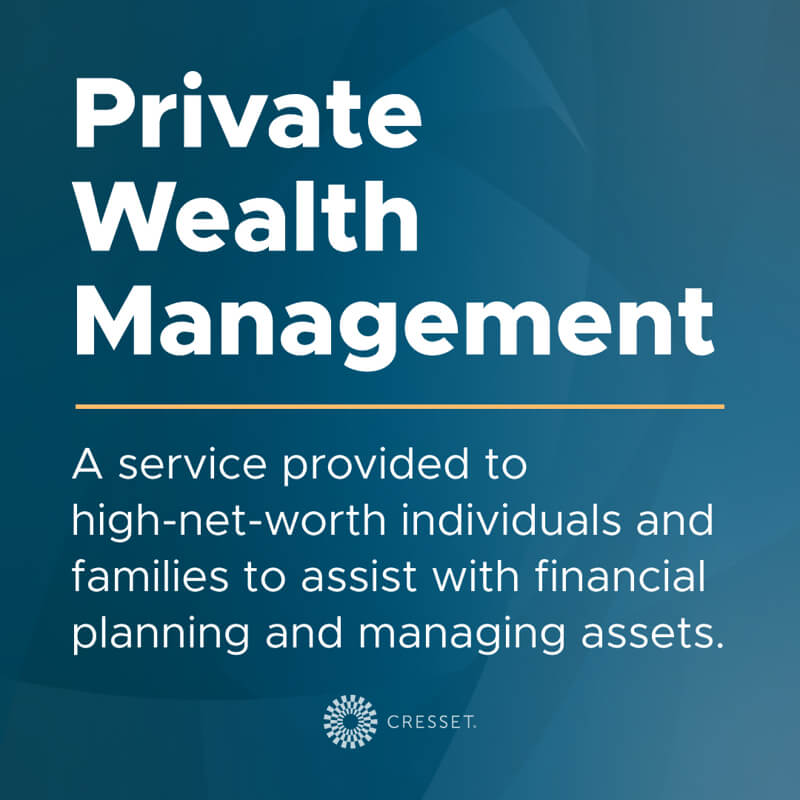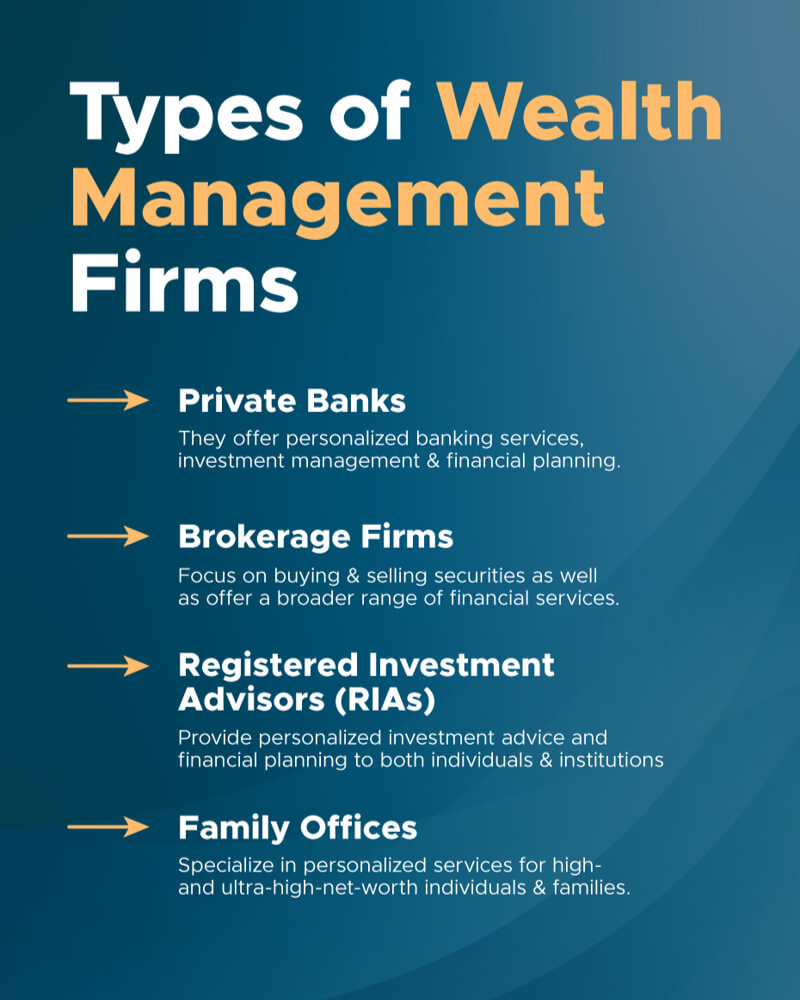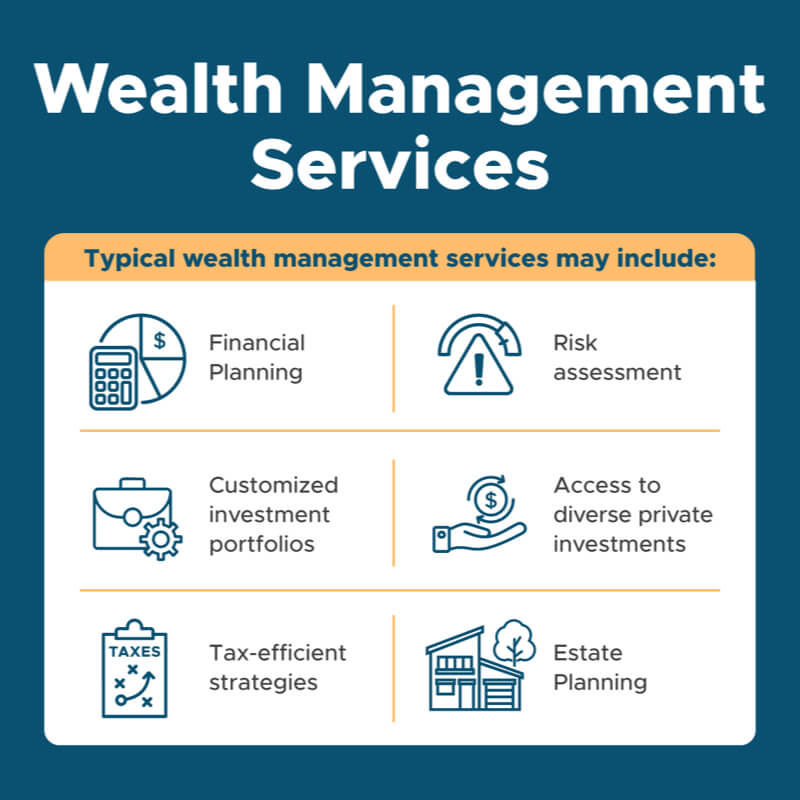Family Office Guide / Private Wealth Management
By providing your email address, you consent to receive messages from Cresset regarding our services. View our Privacy Policy.
9 minute read
For high-net-worth individuals, understanding wealth management is of the utmost importance. Whether you are managing family wealth, or just trying to understand the wealth management process, you will find wealth management explained here. We will cover all the wealth management basics, including what private wealth management is, common wealth management strategies, and the types of wealth management firms available to you.
From firms and advisors to family office wealth management, we aim to equip you with the knowledge required to make informed decisions that will safeguard and enhance your family’s legacy.

Wealth management is appropriately named: it is the process of managing a client’s finances, with the goal of maintaining and growing wealth. While there are several wealth management strategies that can be employed to do so, an effective private wealth management plan is comprehensive, and will generally include such services as financial planning, investment management, and tax and estate planning.
Private wealth refers to privately owned assets, either by an individual or private organization. It is often referred to in comparison to public wealth, which is collectively owned. Private wealth can include cash, and it can also include stocks, real estate, and more. As private wealth accumulates, the management of said wealth can become complicated and more high-stakes, and it may be worth employing private wealth management services.
Let’s begin with a private wealth management definition. Private client wealth management is a service provided to high-net-worth individuals and families to assist with financial planning and managing assets. Private wealth planning can help individuals and families grow their wealth and reach specific financial goals more efficiently, particularly when comprehensive and integrated services are utilized.
The wealth management process involves a combination of services. These may include:
Services offered will depend on the kind of wealth management you decide to pursue based on your financial goals. Certain advisors may have specialties that you require but may not offer comprehensive services. Understanding the specific offerings of a firm or advisor before committing to their services is crucial for successful wealth management.
Before deciding on your preferred method of private wealth management, it is important to understand the role of wealth management firms and advisors. There is some overlap between the two: advisors often work within a larger wealth management office, but they can also operate independently. Below, we will take a look at various types of wealth management firms, what exactly private wealth managers do, and how much you can expect to pay for these services.
Wealth management firms are highly varied, and each type has a slightly different focus. The differences exist primarily in structure and clientele. These are some of the most common types of wealth management firms:
Private wealth managers work closely with clients, helping them reach goals efficiently by advising on the following, and more:
When comparing private wealth managers, be sure to look for a fiduciary financial advisor. Fiduciary financial advisors are required by law to always act in the client’s best interest, which also means disclosing any conflicts of interest where investments are concerned. Your advisor should always put your best interests first, which includes operating with transparency.

For high-net-worth and ultra-high-net-worth individuals, it is worth considering a family office for wealth management. If your financial needs are more complicated, or you are looking for a holistic approach to your financial planning, the comprehensive, integrated strategies of a family office may be the right choice, especially when the primary concern is wealth management for families.
A family office works closely with a family or group of families to manage their wealth and investment portfolios. There are two main types of family offices: single-family offices and multi-family offices. As their names suggest, the difference between the two is that the former serves just one family, and the latter works with multiple families, reducing the cost for the families while increasing the variety in services offered.
Family office wealth management works well for high- or ultra-high-net-worth families, particularly those with complicated finances. In addition to traditional wealth management services, family offices also provide services like day-to-day financial management, family governance, concierge services, and lifestyle maintenance. Their holistic, integrated approach to managing family wealth makes them well suited to handling complex finances and long-term financial goals across generations.
Since selecting the right wealth advisor is one of the most critical choices one can make for their financial future, it can seem like a daunting task. Fortunately, the right guidance can simplify the process. We have put together seven questions that you can ask a potential wealth advisor to make sure that they have the best interests of your family in mind, and are well-equipped to provide the services you require.
If you are still wondering if private wealth management is for you, request an introduction with one of our founders today for more personalized advice tailored to your needs.

By providing your email address, you consent to receive messages from Cresset regarding our services. View our Privacy Policy.